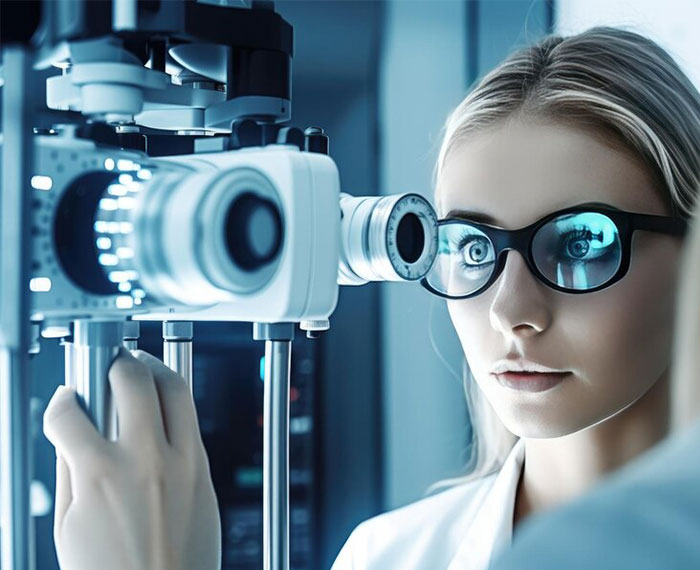
Eye Health
Eye Health and Diseases
One of our 5 sense organs, our eyes connect us to life by allowing us to see the beauties of the world. It has a very important place in learning and perception. Age, genetic diseases and external factors can negatively affect our eye health. However, thanks to today’s technology, various treatment methods have been developed for eye diseases. Many eye diseases can be treated with robotic methods.
The most important factor in eye diseases is early diagnosis. For this reason, any discomfort should not be ignored and eye checks should be done periodically.
Eye Diseases and Treatments
Cataract (Blindness) Disease
There are special lenses in the structure of our eyes. Cataracts occur when these lenses become transparent at a later age due to external factors. Blurring occurs in all objects we see. Advanced cataracts also cause the inability to distinguish objects. The success rate in the treatment of cataract disease with surgical interventions is high.
Eye Pressure
This disease, popularly known as eye pressure, is called glaucoma in medical language. Glaucoma, a disease that can find a solution with early diagnosis and early treatment, is a serious disease that can cause vision loss. For this reason, eye examinations should be performed regularly every year.
Glaucoma treatment is done in three ways:
- Drug treatment
- Surgical treatment
- Eye pressure is treated with laser therapy.
Cornea Pointy
The disease, known as keratoconus, is caused by the progressive thinning or tapering of the cornea, the transparent layer in the uppermost layer of the eye.
The disease, which is mostly seen in adolescence, is usually recognized in the 20s. The treatment of this disease, which has become more common with the aging of the world population, is carried out by specialist physicians with regular follow-up.
First of all, treatment is applied with glasses. Intraocular ring treatment is one of the effective methods. It is not visible from the outside but can be removed if desired by the patient. There is no harm in keeping it for life.
With crosslinking treatment, sharpening can be prevented by acting on corneal molecules. Another treatment method is corneal transplantation. The surgery is performed under general anesthesia and the patient does not feel any pain. Lastly, eye scratching is also among the methods that prevent corneal sharpening.
Retinitis Pigmentosa (Chicken Black)
This disease, known as chicken black, which occurs more frequently in consanguineous marriages, is called hereditary retina.
A chip is placed in the visual center of the patient and treated with the help of special glasses with a camera on it.
Excimer Laser (Eye Scratching)
It is a surgical method used to remove eye defects such as myopia, astigmatism and hyperopia. Laser treatment is an FDA approved safe treatment technology.
Your doctor can determine whether your eyes are suitable for excimer laser. A full eye examination and some further tests are required to determine suitability.
Almost all defects can be removed with excimer laser treatment. You can be discharged on the same day after the treatment.
Who Cannot Have Excimer Laser Treatment?
- People who have had eye surgery before,
- Keratoconus patients,
- Pregnant women
- Breastfeeding women,
- Those with rheumatism,
- People with diabetes,
- Pregnant women
- Breastfeeding women,
Macular Degeneration (Yellow Dot Disease):
It is an eye disease that occurs in the retina center. It usually occurs in people over the age of 50 and can cause advanced vision problems. Since 2000, it is treated with photodynamic therapy and then medication.
Eye Transplant
It is actually a cornea transplant, not an eye transplant, and is treated by taking the cornea from a deceased person and transplanting it to the patient. The healthy parts of the eye are not damaged during corneal transplantation and there has never been a case of tissue rejection in a patient who has previously undergone eye transplantation during tissue transfer.
It can be said that this treatment gives 99% positive response.
Eye Disease Treatment in Turkey
If you contact us, your case will be evaluated by our specialist physicians and you will be informed about your treatment process.



